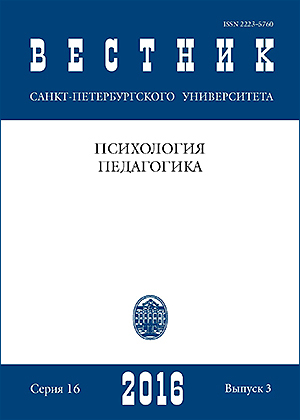Time perspective in normal and pathological aging: the vitauct theory
DOI:
https://doi.org/10.21638/11701/spbu16.2016.316Abstract
Recent decades have been characterized by an increase in elderly people in the population. Mental diseases are associated with old age, particularly depression. Besides the negative changes in ageing also exist processes of “antiageing”, or “vitauct” (Frolkis, 1988) which depend on personal and social impacts, in the connection of which time perspective (TP) plays a leading role. Th is prompts the importance of investigating TP. 48 elderly depressed patients aged from 50 to 80 and 26 older adults aged from 50 to 81 took part in the experiment. All patients were under treatment in the Mental Health Research Center (Moscow). Th e investigation employed ZTPI (Zimbardo, Boyd, 1999; Sircova, 2004) and STAI (Spielberger, 1972; Khanin, 1976) adapted for the Russian population. It was shown that the characteristics of TP in normal ageing refl ect the predominance of its positive aspects, while the negative ones are connected with a state anxiety which demonstrates their dynamism. Among “compensatory” mechanisms are “shift to the future” and active and responsible life position which refl ect psychological vitauct. Th e “depressive” TP profi le shows an ambivalent attitude to the past, helplessness in life organization, low orientation towards the future. Resources of the past, the possibility to get positive emotions in the present are not inaccessible to depressed people. Th ese results clarify how vitauct IS manifests in the ageing process (repective to TP), whose resources can play a supportive role for the compensation of negative changes
Keywords:
vitauct, positive ageing, late life, time perspective, ZTPI, depression, anxiety, STAI
Downloads
References
References
Downloads
Published
How to Cite
Issue
Section
License
Articles of "Vestnik of Saint Petersburg University. Psychology" are open access distributed under the terms of the License Agreement with Saint Petersburg State University, which permits to the authors unrestricted distribution and self-archiving free of charge.




